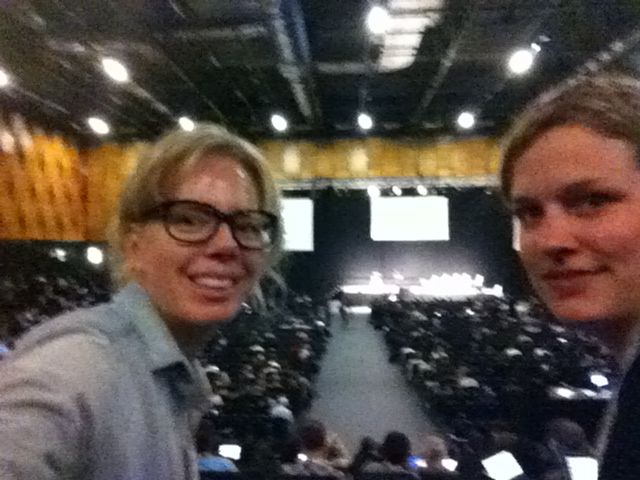Die Inhalte dieser Seite sind leider nicht auf Deutsch verfügbar.
Seitenpfad:
Bremen International Graduate School for Marine Sciences
Nina Maier
Report of GLOMAR PhD student Nina Maier about her participation in the Planet under Pressure Conference, London, UK, 24 - 29 March 2012
The ‘Planet under Pressure’ Conference in London this year in March aimed at addressing the big challenges our planet faces in times of global change. Its main goal was to compile a comprehensive collection of scientific knowledge on some of the most pressing threats of present time. Therefore, the central motto of the conference was to work together, regardless of the background of different disciplines, and across different levels, in order to develop new visions for the future and to find solutions for promoting the sustainable use of resources.
For social scientists, the conference provided the chance to attend the talks of two famous coryphaei: Anthony Giddens and Oran Young. In their visionary and inspiring talks, they sketched new paradigms for science and society needed to overcome the challenges of our time.
Oran Young emphasized that the interconnectedness of the problems of our time brings us to the boundaries of our knowledge. In order to address the challenge, a paradigm shift is needed with a planetary stewardship at its core, instead of further pursuing national approaches. Quite optimistically, he added that despite the fact that the effort needed seems overwhelming, such substantial paradigm shifts have worked before, such as the transition from national to international conceptualization of security after World War II.
Anthony Giddens’ analysis of the current state of the planet started with the notion that we have created risks which we are not able to control anymore. For this reason, we cannot rely on previous responses to them. In order to develop new solutions for the planet, Giddens stressed that a new policy style would be needed. This should include new coalitions of nations based on regional connectedness, preferably headed by leadership countries which promote sustainable action in order to overcome the current destructive models of development.
Furthermore, the large number of conference sessions addressed different individual pressures and challenges, such as climate change and its consequences for the environment and climate migration, research on risk-assessment and risk-management, or the regulation of waters in multi-level systems, in more detail. Altogether, the conference provided a good overview of the topics considered most threatening to our planet as well as the relevant research currently carried out in these fields. It also became clear that enhancing the constant exchange between scientists from different disciplines is still a major challenge on the way to a more comprehensive understanding of ecosystem interactions.
I would like to thank GLOMAR for funding the attendance of this major international conference.
For social scientists, the conference provided the chance to attend the talks of two famous coryphaei: Anthony Giddens and Oran Young. In their visionary and inspiring talks, they sketched new paradigms for science and society needed to overcome the challenges of our time.
Oran Young emphasized that the interconnectedness of the problems of our time brings us to the boundaries of our knowledge. In order to address the challenge, a paradigm shift is needed with a planetary stewardship at its core, instead of further pursuing national approaches. Quite optimistically, he added that despite the fact that the effort needed seems overwhelming, such substantial paradigm shifts have worked before, such as the transition from national to international conceptualization of security after World War II.
Anthony Giddens’ analysis of the current state of the planet started with the notion that we have created risks which we are not able to control anymore. For this reason, we cannot rely on previous responses to them. In order to develop new solutions for the planet, Giddens stressed that a new policy style would be needed. This should include new coalitions of nations based on regional connectedness, preferably headed by leadership countries which promote sustainable action in order to overcome the current destructive models of development.
Furthermore, the large number of conference sessions addressed different individual pressures and challenges, such as climate change and its consequences for the environment and climate migration, research on risk-assessment and risk-management, or the regulation of waters in multi-level systems, in more detail. Altogether, the conference provided a good overview of the topics considered most threatening to our planet as well as the relevant research currently carried out in these fields. It also became clear that enhancing the constant exchange between scientists from different disciplines is still a major challenge on the way to a more comprehensive understanding of ecosystem interactions.
I would like to thank GLOMAR for funding the attendance of this major international conference.



